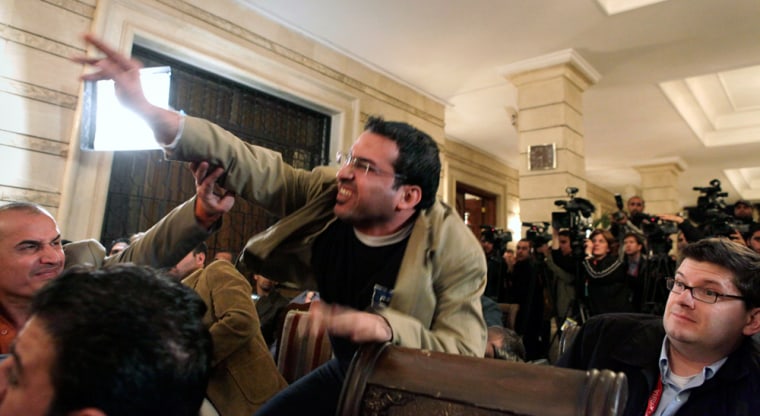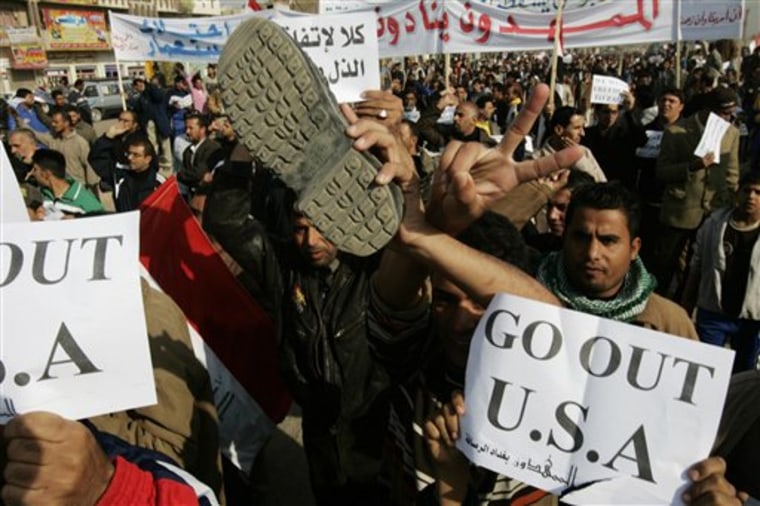Thousands of Iraqis took to the streets Monday to demand the release of a reporter who threw his shoes at President George W. Bush, as Arabs across many parts of the Middle East hailed the journalist as a hero and praised his insult as a proper send-off to the unpopular U.S. president.
The protests came as suicide bombers and gunmen targeted Iraqi police, U.S.-allied Sunni guards and civilians in a series of attacks Monday that killed at least 17 people and wounded more than a dozen others, officials said.
Journalist Muntadhar al-Zeidi, a 28-year-old unmarried Shiite, was kidnapped by militants last year and, separately, detained briefly by the U.S. military prior to this incident — a story of getting hit from all sides that is bitterly familiar to many Iraqis.
Over time, he came to hate both the U.S. military occupation and Iran's interference in Iraq, his family told The Associated Press on Monday.
Could faces charges of insulting a foreign leader
He was held Monday in Iraqi custody for investigation and could face charges of insulting a foreign leader and the Iraqi prime minister, who was standing next to Bush.
Conviction carries a sentence of up to two years in prison or a small fine — although it's unlikely he would face the maximum penalty given his newfound cult status in the Arab world.
He was also being tested for alcohol and drugs, and his shoes were being held as evidence, said the official, speaking on condition of anonymity because he was not authorized to talk to the media.
Showing the sole of your shoe to someone in the Arab world is a sign of extreme disrespect, and throwing your shoes is even worse.
Several thousand people demonstrated in Baghdad and other cities to demand the journalist's release. The attack was the talk of the town in coffee shops, business offices and even schools — just as it was a subject across much of the Arab world.
A day after the attack, al-Zeidi's three brothers and one sister gathered in al-Zeidi's simple, one-bedroom apartment in west Baghdad. The home was decorated with a poster of Latin American revolutionary leader Che Guevara, who is widely lionized in the Middle East.
Family members expressed bewilderment over his action and concern about his treatment in Iraqi custody. But they also expressed pride over his defiance of an American president who many Iraqis believe has destroyed their country.
"I swear to Allah, he is a hero," said his sister, who goes by the nickname Umm Firas, as she watched a replay of her brother's attack on an Arabic satellite station. "May Allah protect him."
The family insisted that al-Zeidi's action was spontaneous — perhaps motivated by the political turmoil that their brother had reported on, plus his personal brushes with violence and the threat of death that millions of Iraqis face daily.
‘The international day for shoes’
Newspapers across the Arab world on Monday printed front-page photos of Bush ducking the flying shoes, and satellite TV stations repeatedly aired the incident, which provided fodder for jokes and was hailed by the president's many critics in the region.
"Iraq considers Sunday as the international day for shoes," said a joking text message circulating around the Saudi capital Riyadh.
Palestinian journalists in the West Bank town of Ramallah joked about who would be brave enough to toss their shoes at Secretary of State Condoleezza Rice, another U.S. official widely disliked in the region.
Many users of the popular Internet networking site Facebook posted the video of the incident to their profile pages, showing al-Zeidi leap from his chair as Bush and Iraqi Prime Minister Nouri al-Maliki were about to shake hands Sunday and hurl his shoes at the president, who was about 20 feet away. Bush ducked the airborne footwear and was not injured in the incident.
"This is a farewell kiss, you dog," al-Zeidi yelled in Arabic as he threw his shoes. "This is from the widows, the orphans and those who were killed in Iraq."

Al-Zeidi was immediately wrestled to the ground by Iraqi security guards. The incident raised fears of a security lapse in the heavily guarded Green Zone where the press conference took place. Reporters were repeatedly searched and asked to show identification before entering and while inside the compound, which houses al-Maliki's office and the U.S. Embassy.
Al-Zeidi's tirade was echoed by Arabs across the Middle East who are fed up with U.S. policy in the region and still angry over Bush's decision to invade Iraq in 2003 to topple Saddam Hussein.
Praise on the Arab street
The response to the incident by Arabs in the street was ecstatic.
"Al-Zeidi is the man," said 42-year-old Jordanian businessman Samer Tabalat. "He did what Arab leaders failed to do."
Hoping to capitalize on this sentiment, al-Zeidi's TV station, Al-Baghdadia, repeatedly aired pleas to release the reporter Monday, while showing footage of explosions and playing background music that denounced the U.S. in Iraq.
"We have all been mobilized to work on releasing him, and all the organizations around the world are with us," said Abdel-Hameed al-Sayeh, the manager of Al-Baghdadia in Cairo, where the station is based.
Al-Jazeera television interviewed Saddam's former chief lawyer Khalil al-Dulaimi, who offered to defend al-Zeidi, calling him a "hero."
In Baghdad's Shiite slum of Sadr City, thousands of supporters of radical Shiite cleric Muqtada al-Sadr burned American flags to protest against Bush and called for the release of al-Zeidi.
"Bush, Bush, listen well: Two shoes on your head," the protesters chanted in unison.
In Najaf, a Shiite holy city, some protesters threw their shoes at an American patrol as it passed by. Witnesses said the American troops did not respond and continued on their patrol.
Al-Zeidi joined Al-Baghdadia television in September 2005 after graduating from Baghdad University with a degree in communications. Two years later, he was seized by gunmen while on an assignment in a Sunni district of north Baghdad.
He was freed unharmed three days later after Iraqi television stations broadcast appeals for his release. At the time, al-Zeidi told reporters he did not know who kidnapped him or why, but his family blamed al-Qaida and said no ransom was paid.
In January he was taken again, this time arrested by American soldiers who searched his apartment building, his brother, Dhirgham, said. He was released the next day with an apology, the brother said.
Those experiences helped mold a deep resentment of both the U.S. military's presence here and Iran's pervasive influence over Iraq's cleric-dominated Shiite community, according to his family.
"He hates the American material occupation as much as he hates the Iranian moral occupation," Dhirgham said, alluding to the influence of pro-Iranian Shiite clerics in political and social life. "As for Iran, he considers the regime to be the other side of the American coin."
Daily attacks continue
Violence in Iraq has declined significantly over the past year, but daily attacks continue. A truck bomb killed at least nine police officers Monday and wounded 13 others, including two civilians, in Khan Dhari, west of Baghdad, said Dr. Omar al-Rawi at the Fallujah hospital, where the dead and wounded were taken.
Hours earlier, a female suicide bomber knocked on the front door of the home of the leader of a local chapter of the Sunni volunteer militia north of Baghdad and blew herself up, killing him, said an Iraqi police official, speaking on condition of anonymity because he was not authorized to talk to the press.
Also Monday, gunmen killed seven people from a single family, members of the minority Yazidi sect, when they stormed into their home in northern Iraq, police said.
